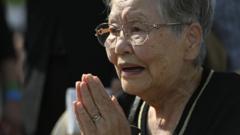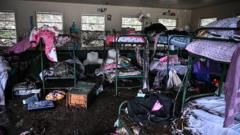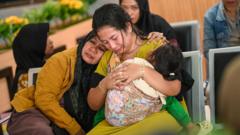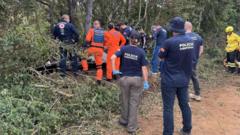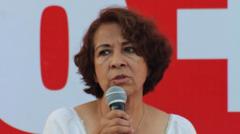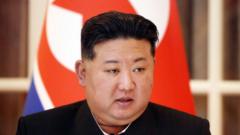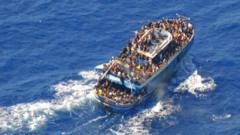Nagasaki's mayor, Shiro Suzuki, urges an end to wars while reflecting on the city's tragic past during an emotional ceremony marking 80 years since the atomic bomb was dropped.
Nagasaki's Mayor Calls for Peace, Warns of Nuclear Conflict on 80th Anniversary of Bombing

Nagasaki's Mayor Calls for Peace, Warns of Nuclear Conflict on 80th Anniversary of Bombing
Ceremony commemorates devastating effects of atomic bomb while highlighting ongoing global conflicts.
In a poignant ceremony commemorating the 80th anniversary of the U.S. atomic bombing, Nagasaki's mayor has urged for an end to worldwide conflicts, emphasizing the devastating potential of escalating tensions. On August 9, 1945, the city faced unimaginable destruction when an atomic bomb was dropped, killing approximately 74,000 people—an event that significantly contributed to concluding World War II.
During a Peace Declaration delivered on this somber occasion, Mayor Shiro Suzuki voiced concerns over the global state of unrest, stating, "Conflicts around the world are intensifying in a vicious cycle of confrontation and fragmentation. If we continue on this trajectory, we will end up thrusting ourselves into a nuclear war." The recent years have seen the legacy of nuclear devastation echo in ongoing conflicts such as the war in Ukraine and the violence in Gaza, which continue to threaten global stability.
Survivors of the Nagasaki attack reflected on their experiences, offering a chilling reminder of the horror inflicted upon them. Hiroshi Nishioka, a 93-year-old survivor, recounted the physical and emotional scars left by the explosion, stating, "Even the lucky ones gradually began to bleed from their gums and lose their hair." His words underscored the lingering effects of radiation that plagued survivors long after the bomb was dropped.
A moment of silence marked the event, honoring the victims, while Nagasaki's twin cathedral bells rang together for the first time since the bombing in a symbolic call for peace. Participants, spanning multiple generations, offered water in homage to victims who desperately sought relief from their suffering on that fateful day.
Reflecting on the event's significance, participants acknowledged the importance of remembering history in the face of contemporary conflicts. This year, the invitation was extended to Israel, Russia, and Belarus as efforts are made to promote inclusivity, contrasting with previous years where invitations were curtailed due to security concerns.
The heightened international concern regarding nuclear weapons was further emphasized by the 2021 enforcement of the Treaty on the Prohibition of Nuclear Weapons, which aims to ban nuclear arms, despite opposition from several nuclear-capable states arguing that such arsenals are essential for deterrence.
As Nagasaki continues to grapple with its past, the messages delivered during the ceremony serve as a somber reminder of the consequences of war and the urgent need for collective peace-building efforts across the globe.
During a Peace Declaration delivered on this somber occasion, Mayor Shiro Suzuki voiced concerns over the global state of unrest, stating, "Conflicts around the world are intensifying in a vicious cycle of confrontation and fragmentation. If we continue on this trajectory, we will end up thrusting ourselves into a nuclear war." The recent years have seen the legacy of nuclear devastation echo in ongoing conflicts such as the war in Ukraine and the violence in Gaza, which continue to threaten global stability.
Survivors of the Nagasaki attack reflected on their experiences, offering a chilling reminder of the horror inflicted upon them. Hiroshi Nishioka, a 93-year-old survivor, recounted the physical and emotional scars left by the explosion, stating, "Even the lucky ones gradually began to bleed from their gums and lose their hair." His words underscored the lingering effects of radiation that plagued survivors long after the bomb was dropped.
A moment of silence marked the event, honoring the victims, while Nagasaki's twin cathedral bells rang together for the first time since the bombing in a symbolic call for peace. Participants, spanning multiple generations, offered water in homage to victims who desperately sought relief from their suffering on that fateful day.
Reflecting on the event's significance, participants acknowledged the importance of remembering history in the face of contemporary conflicts. This year, the invitation was extended to Israel, Russia, and Belarus as efforts are made to promote inclusivity, contrasting with previous years where invitations were curtailed due to security concerns.
The heightened international concern regarding nuclear weapons was further emphasized by the 2021 enforcement of the Treaty on the Prohibition of Nuclear Weapons, which aims to ban nuclear arms, despite opposition from several nuclear-capable states arguing that such arsenals are essential for deterrence.
As Nagasaki continues to grapple with its past, the messages delivered during the ceremony serve as a somber reminder of the consequences of war and the urgent need for collective peace-building efforts across the globe.

